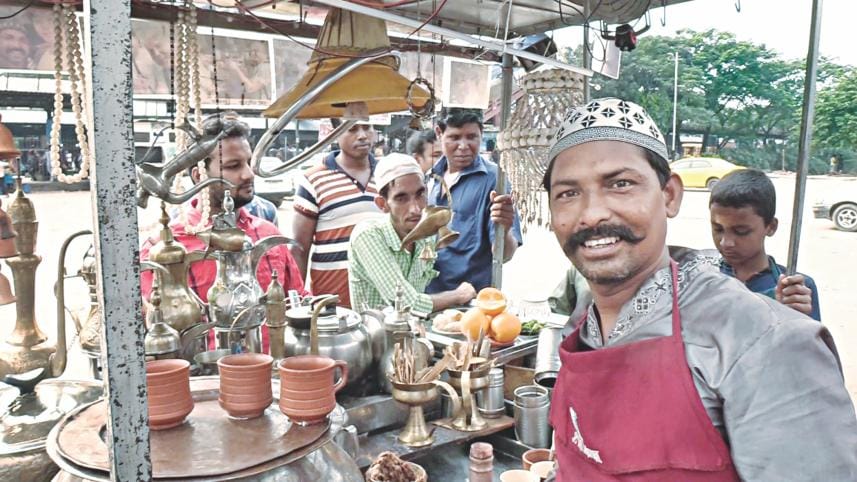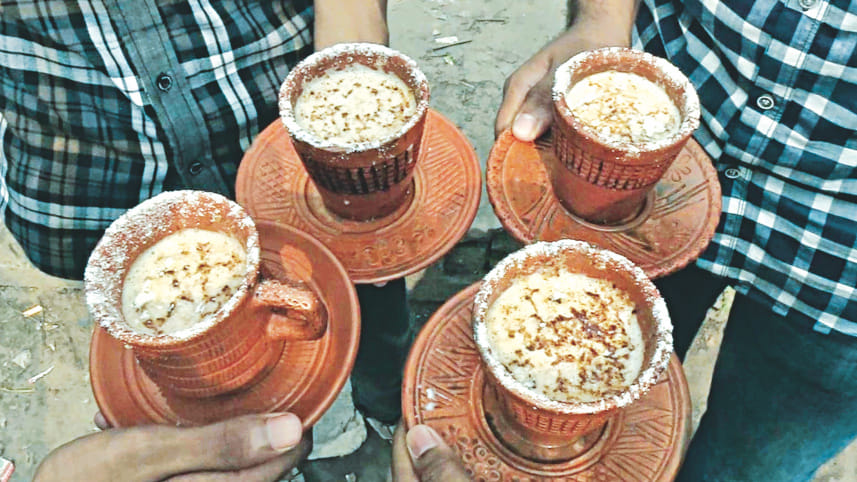A cup of tea worth enduring Dhaka traffic


The thought of driving an hour and a half in a city beleaguered by unending traffic congestion to do anything is stress-inducing. Munia and her friends -- all university students -- drove all the way from Mirpur-10 to Dhaka Airport Railway Station just to have some tea.
Then again, “Raja Mama’r Cha” is no ordinary tea.
“It’s the kind of tea for which you can drive for two hours,” Munia said, looking up from her cup of cashew nut tea. “It’s not just me -- this place brims with school and college students from all over Dhaka.”
It’s true. In front of the tea stall behind Airport Railway Station, people queue up to relish Raja’s exotic hot drinks.
At first glance, the stall looks like a tea shop straight out of the Middle East. Everything about the decoration reflects mainstream Arabic aesthetic. From the pictures, to showpieces, to even the brass-made utensils -- Raja brought everything from the UAE.
“I left for Dubai to work at a restaurant in January this year. But I had to come back after just three months; I couldn’t cope with life there... it was too harsh for me,” Raja said.
But the entire experience in Dubai did not go to waste. “During my time there, I learned how to make traditional Arabic tea. I decided to come back home and start a tea stall with the recipes,” he said.
True to his plan, Raja started his stall in mid-August. The responses validate his hunch that the business would work.
“I come here with my friends all the time. I don’t think I’ve ever had tea this good,” said Afsana Mimi, a self-proclaimed tea aficionado.
Zakir, a student, comes here at least twice every day. “Unlike other tea stalls, it’s always neat and clean,” he said.
The best of the endorsements comes from Meherun Nisa. “I hope it becomes a big tea shop one day.” The blessing for growth is coveted by every small business owner.
But all is not sunshine and rainbows. Some relatives are not fond of the idea that Raja’s source of income is selling tea. Raja, however, does not let the negativity get to him.

“It’s honest work. I love my business and I’m satisfied that it keeps my family well-fed,” a beaming Raja said.
“It’s an honour for me that people come to my humble tea shop from such distances. I try to ensure they get the best experience here,” he added.
And it shows -- there’s always a crowd in front of the stall and orders arrive after a necessary waiting time.
At Tk 15 per cup, the cashew nut flavoured “Special Raja Tea” is the top selling drink. It’s brewed with cashew nuts, almonds, raisins, a bit of Horlicks and different kinds of coffee beans. His menu also includes “malai (clotted cream) tea”, “tetul (tamarind) tea”, “malta (orange) tea” and more. Raja sells about 700-750 cups on average every day.
Raja serves his hot drinks in clay cups, and that’s not just because it is the environmentally responsible thing to do.
“This soil pulled me back from Dubai. These clay cups are my homage to it,” he said.
Do you have a Dhaka Vibe story to share? Email us your ideas or reports to dhakavibeds@gmail.com



 For all latest news, follow The Daily Star's Google News channel.
For all latest news, follow The Daily Star's Google News channel.
Comments